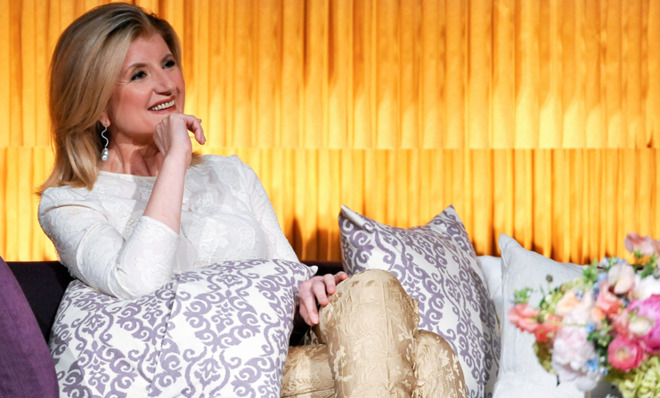Dear Arianna Huffington: I don't want to thrive
I just want to live a fulfilling life


A free daily email with the biggest news stories of the day – and the best features from TheWeek.com
You are now subscribed
Your newsletter sign-up was successful
In her new best-selling book Thrive: The Third Metric to Redefining Success and Creating a Life of Well-Being, Wisdom, and Wonder, Arianna Huffington argues that there is much more to life than money and power.
The Huffington Post founder, in an effort to combat time famine (the apparently highly contagious epidemic of our over-working age), calls for making room in our lives for things like meditation, yoga, volunteer-work, museum visits, and long conversations uninterrupted by smartphones.
This advice sounds reasonable and attractive. Who wouldn't benefit from taking time away from screens, stretching and chanting, and catching up with friends?
The Week
Escape your echo chamber. Get the facts behind the news, plus analysis from multiple perspectives.

Sign up for The Week's Free Newsletters
From our morning news briefing to a weekly Good News Newsletter, get the best of The Week delivered directly to your inbox.
From our morning news briefing to a weekly Good News Newsletter, get the best of The Week delivered directly to your inbox.
But this isn't all Huffington is after. She wants you to thrive. In Huffington's world, this comes through some combination of "well-being, wisdom, wonder, and giving." And so she has come up with a four-step program to help you thrive in what she calls "the third metric." (The first two conventional metrics of success are money and power.)
As you can probably deduce from the confusing counting and corporate self-help seminar terminology, this advice ultimately just adds up to another source of clutter in our already cluttered lives.
Huffington's approach is not much different than the "live your best life" ethos touted by O, The Oprah Magazine (I'm a subscriber!) and other women's magazines. Huffington wants us to breathe, to savor moments — but not necessarily for the pleasure of these activities, but because they are what she considers part of a successful life. And there we have it again. Success. The best. Having it all.
To be a woman born in the past 50 years is to be someone who has spent her life subjected to such pleas for self-improvement. Somewhere out there, I've often been told, there is a better me, and it is she I need to find. At 34, I am starting to have enough.
A free daily email with the biggest news stories of the day – and the best features from TheWeek.com
Sure, I want to live a good life, a full life — but that is not the same as my best life. I don't want to live my best life. It sounds exhausting. And futile.
Reading Thrive, I often found myself imagining the long list of appointments that surely populate Huffington's calendar each day, synced between her multiple iPhones and BlackBerrys, and seeing "meditate" or "yoga" squeezed between board meetings, cocktail parties, and transatlantic flights. If this is work-life balance, I want none of it.
Huffington sees Thrive as a spiritual manifesto, a roadmap for individuals to reconnect with all things transcendent, but again and again returns to the idea that following this advice will increase our productivity at work. "What's good for us as individuals is also good for businesses and for countries," she writes.
Now, Huffington does concede that "there is a paradox in using the idea of enhanced performance as a selling point for practices that would help us redefine success." She says that her goal is to offer an entry point and even if "right now you just want to be better at your job … along the way you will likely gain some added perspective on what matters in your life."
Still, the regular references to celebrity Thrivers like Steve Jobs and Bill Gates betrays Huffington's lack of interest in truly challenging the twin pillars of money and power in the name of the Third Metric. And it is not all that helpful for us regular folk to hear how the super rich and super brilliant weave meditation or giving into their lives. Those guys are models really only for themselves. More importantly, by defending the Thrive lifestyle only by referencing the rich and famous, Huffington is telling us how much she still values the moneyed and powerful, all the while telling us to not work so hard to get money and power. There had to have been a nice schoolteacher in Chicago who Thrives, or maybe a commercial fisherman in Maine. Where were they in Huffington's manifesto?
Or perhaps if the book had delved deeper into Huffington's life experience, picked the scabs from her formerly non-Thriving life and allowed us to bear witness to what came rushing forth, maybe then we would have arrived at a deeper understanding of how Thriving works and why it really matters. Instead, as is, the book is relatively bloodless.
Huffington makes a real effort to say the right things, but ultimately there just isn't enough at stake, and there isn't enough actionable wisdom and advice for the vast majority of readers to apply to their lives.
We don't need to make more to-do lists. We don't need more metrics. We don't need to do anything for the sole sake of bettering ourselves. Instead, we need to start getting out of our own way and just yield to the mystery and irrationality of life. We don't have to call it anything except living.
Elissa Strauss writes about the intersection of gender and culture for TheWeek.com. She also writes regularly for Elle.com and the Jewish Daily Forward, where she is a weekly columnist.
-
 The Olympic timekeepers keeping the Games on track
The Olympic timekeepers keeping the Games on trackUnder the Radar Swiss watchmaking giant Omega has been at the finish line of every Olympic Games for nearly 100 years
-
 Will increasing tensions with Iran boil over into war?
Will increasing tensions with Iran boil over into war?Today’s Big Question President Donald Trump has recently been threatening the country
-
 Corruption: The spy sheikh and the president
Corruption: The spy sheikh and the presidentFeature Trump is at the center of another scandal
